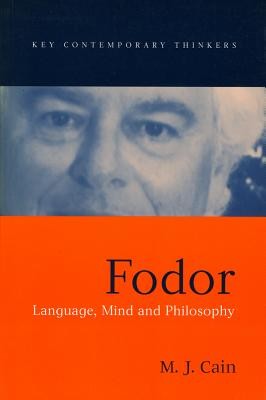
- We will send in 10–14 business days.
- Author: Mark J Cain
- Publisher: Polity Press
- ISBN-10: 0745624731
- ISBN-13: 9780745624730
- Format: 15.2 x 22.8 x 1.9 cm, softcover
- Language: English
- SAVE -10% with code: EXTRA
Reviews
Description
Jerry Fodor is one of the most important philosophers of mind in recent decades. He has done much to set the agenda in this field and has had a significant influence on the development of cognitive science. Fodor's project is that of constructing a physicalist vindication of folk psychology and so paving the way for the development of a scientifically respectable intentional psychology. The centrepiece of his engagement in this project is a theory of the cognitive mind, namely, the computational theory of mind, which postulates the existence of a language of thought. Fodor: Language, Mind and Philosophy is a comprehensive study of Fodor's writings. Individual chapters are devoted to each of the major issues raised by his work and contain extensive discussion of his relationships to key developments in cognitive science and to the views of such philosophical luminaries as Dennett, Davidson and Searle.
This accessible book will appeal to advanced level undergraduate students of philosophy and related disciplines. It will also be of great interest to professional philosophers and cognitive scientists.
EXTRA 10 % discount with code: EXTRA
The promotion ends in 19d.05:16:18
The discount code is valid when purchasing from 10 €. Discounts do not stack.
- Author: Mark J Cain
- Publisher: Polity Press
- ISBN-10: 0745624731
- ISBN-13: 9780745624730
- Format: 15.2 x 22.8 x 1.9 cm, softcover
- Language: English English
Jerry Fodor is one of the most important philosophers of mind in recent decades. He has done much to set the agenda in this field and has had a significant influence on the development of cognitive science. Fodor's project is that of constructing a physicalist vindication of folk psychology and so paving the way for the development of a scientifically respectable intentional psychology. The centrepiece of his engagement in this project is a theory of the cognitive mind, namely, the computational theory of mind, which postulates the existence of a language of thought. Fodor: Language, Mind and Philosophy is a comprehensive study of Fodor's writings. Individual chapters are devoted to each of the major issues raised by his work and contain extensive discussion of his relationships to key developments in cognitive science and to the views of such philosophical luminaries as Dennett, Davidson and Searle.
This accessible book will appeal to advanced level undergraduate students of philosophy and related disciplines. It will also be of great interest to professional philosophers and cognitive scientists.


Reviews